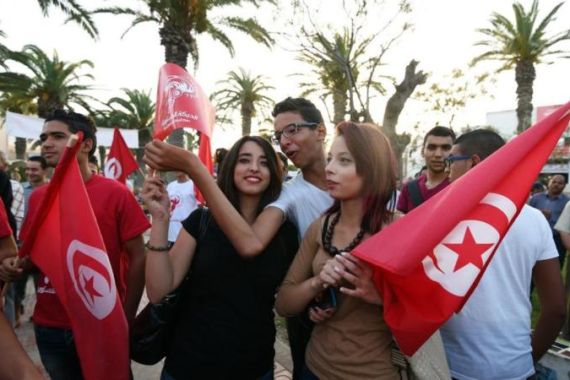Tunisia’s political parties and the shared vision
Common goals unite the Islamists and their secularist adversaries in Tunisia.

Tunisia’s first democratic parliamentary election will be a contest between political forces that wish to shake the firm grip the “Bourguiba Complex” (reference to Habib Bourguiba, the country’s first president and national “mentor”) has had over Tunisians since independence from France in 1956, and others who wish to start a new political chapter.
The Islamist Ennahda Party and its rival, Nidaa Tounes, the party formed as recently as 2012, represent this polarisation at the heart of Tunisia’s evolving politics since the January 14, 2011, uprising that ousted dictator Zine El Abidine Ben Ali. Ennahda, neo-Islamist and moderate, began its opposition to Bourguiba’s secularist policies in the late 1970s. Nidaa Tounes, secular and quasi-liberal, rivals Ennahda’s popularity thanks to elites formerly affiliated to the ousted regime and Destour Party members nostalgic for the era of Bourguiba.
Keep reading
list of 4 items‘Defining moment’: What’s next for Tunisia’s Ennahdha?
Former Tunisian President Ben Ali dies in Saudi exile
Tunisian autocrat Ben Ali dies in Saudi exile
On Friday night, Ennahda’s moderate leadership in its finale to weeks of hectic electoral campaigning looked to be at odds with the brand of religious ideology found in other Arab and Muslim countries.
It displayed a rare knack for partying to the tune of music punctuated by speeches by key leaders, including females and youth figures contesting seats in more than 30 districts. Close to 60,000 people celebrated the official end of the electoral campaign in a section of Bourguiba Boulevard. Men and women, often accompanied by their children, mingled, clapped, danced and chanted party slogans, including for the return of Ennahda and against Nidaa Tounes.
Terrorism and economic downturn
In theory, Friday was not a good day for Islamist politics. Hours earlier a policeman was killed following a raid on a house in the suburbs of Tunis. This was part of a standoff between security forces and alleged Ansar al-Sharia terrorists, six of whom were killed. The story circulated widely among Tunisians currently united by fear of terrorism and economic downturn.
|
|
| Tunisia launches raids ahead of polls |
It is ballots, not bullets that Ennahda believes will catapult it into pole position today when the country’s first freest poll ever takes place. In speech after speech the stress was on the “civilian state”, “rule of law”, “institution-building”, “democracy”, and consensus-building. The party presented itself as the alternative to extremist religious tendencies and to parties with old-regime association.
In terms of political rhetoric, Nidaa Tounes speaks a similar language: It is the alternative to religious politics, and to Ennahda and its troika partners’ perceived dismal record in the coalition government from late 2011 until January 2014.
A key difference is that Ennahda has a disciplined and stable constituency. Nidaa Tounes lacks the discipline and coherence and a much less fixed constituency. At least three political currents (Destour Movement, Al-Moubadara, and even Afeq) or parties vie for the vote of the same constituency.
Despite the divisive rhetoric, the surprise in today’s election could be a shared victory for Ennahda and Nidaa Tounes, potentially forcing the two to work together for the greater sake of democratic consolidation and a desperately needed synergy to tackle budgetary deficits, double-digit unemployment, indebtedness, and other structural economic problems.
There is an impression out there that Ennahda and Nidaa Tounes are divided by ideology. That may be so. Both seem to embrace free market economics. Where politics has failed to unite the two leading forces in Tunisia, the market may succeed. It is uniting the Islamists and their secularist adversaries. Both parties’ programmes leave no doubt that strategists in both camps realise that winning the hearts and minds of the country’s youth, including graduates among whom one in three is unemployed, will be achieved in the market and not in the realm of ideological propaganda.
Beyond Bourguiba
Whether they love him or hate him, Tunisians always return to Bourguiba Boulevard, to stroll or to talk politics for or against him. On Friday, the last day of the election campaign, even Ennahda returned to Bourguiba, this time to party.
A lasting image is how Tunisian parties shared the Bourguiba Avenue, with their stands communicating with the public about their programmes and distributing leaflets. There were circles of debaters, reminiscent of Speaker’s Corner in Hyde Park, London, in which Tunisians discussed their preferences, differences and shared dreams, including becoming the Arab world’s only democracy.
Party crests said it all – the light bulb (Union for Tunisia alliance) to brighten the political horizon, the olive tree (the Republican bloc), the stop sign used by an independent list sending the message of “hands-off Tunisia” and opposition to economic liberalisation, and the scissors encoding a break with corrupt and dictatorial practises.
In simple terms, how the “dove” (Ennahda) and the palm tree (Nidaa Tounes) will live together after the October 26 election remains the biggest question in today’s contest. Will the dove nest in the palm tree? Will the palm tree be habitable or thorny? The answer is with Tunisian voters who are ready to speak out, to give answers to these questions.
Larbi Sadiki is a specialist in Arab democratisation, revolution and transitions, and has been an academic at Australian National University, Exeter University, Westminster University and Qatar University.
